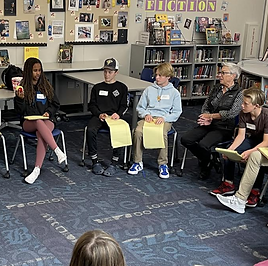
MEET KAREN
Karen Junker is a passionate professional whose work emphasizes equity and dignity for students and teachers. Karen Junker’s philosophy of culture and climate is that every school community member be valued, respected and contributing; her work prioritizes inclusion and participation. She has broad experience working with school sites to cultivate capacities for implementing and sustaining restorative approaches to classroom culture, academic success and school discipline.
Ms. Junker is a mathematics teacher with ten years of experience in middle school and ten years in high school, including one year of substituting. She is a published author with broad expertise in using restorative practices to build classroom community, manage classroom behavior and deliver academic curriculum.
Additionally, Ms. Junker served as Restorative Practices Coordinator for a large urban middle school where she, working with the school's leaders, produced noteworthy results in terms of discipline reduction, suspension diversion, and school-wide academic achievement.
(See Junker, K., & MacLean, H. (2016). Using restorative principles to redesign a middle school for the common good. In A. H. Normore & A. I. Lahera (Eds.), Restorative practice meets social justice: un-silencing the voices of “at-promise” student populations (pp. ). Dominguez Hills, CA: Information Age Publishing.)
She works collaboratively with stakeholders to craft and implement site-sustaining school-wide restorative practices including community building circles, conflict de-escalation and suspension diversion using student panels.
Ms. Junker is a trainer certified by the International Institute for Restorative Practices, trained by Dominic Barter in facilitating restorative circles, and trained in the use of Positive Psychology in the classroom.
Karen Junker’s philosophy of culture and climate is that every school community member be valued and respected; her work prioritizes inclusion. She works with stake-holders to craft school discipline policies that include using restorative circles for students who are chronically disruptive in the classroom; she works with schools to offer restorative consequences rather than rote punishment.

Start where you are.
As little as 10% can tip the scale of a culture. With coordinated and focused action, and by adding people who add value, a minority view of what's possible can quickly become the majority view of what's possible.